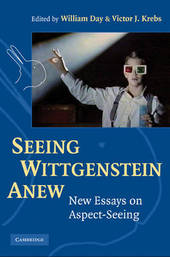
|
Seeing Wittgenstein Anew
Hardback
Main Details
| Title |
Seeing Wittgenstein Anew
|
| Authors and Contributors |
Edited by William Day
|
|
Edited by Victor J. Krebs
|
| Physical Properties |
| Format:Hardback | | Pages:412 | | Dimensions(mm): Height 234,Width 157 |
|
| Category/Genre | Western philosophy from c 1900 to now |
|---|
| ISBN/Barcode |
9780521838436
|
| Classifications | Dewey:192 |
|---|
| Audience | | Tertiary Education (US: College) | |
|---|
|
Publishing Details |
| Publisher |
Cambridge University Press
|
| Imprint |
Cambridge University Press
|
| Publication Date |
15 March 2010 |
| Publication Country |
United Kingdom
|
Description
Seeing Wittgenstein Anew is a collection which examines Ludwig Wittgenstein's remarks on the concept of aspect-seeing, showing that it was not simply one more topic of investigation in Wittgenstein's later writings but rather a pervasive and guiding concept in his efforts to turn philosophy's attention to the actual conditions of our common life in language. The essays in this 2010 volume open up novel paths across familiar fields of thought: the objectivity of interpretation, the fixity of the past, the acquisition of language, and the nature of human consciousness. Significantly, they exemplify how continuing consideration of the interrelated phenomena of aspect-seeing might produce a fruitful way of doing philosophy in a new century.
Author Biography
William Day is Associate Professor of Philosophy at Le Moyne College. He writes on aesthetics and moral perfectionist thought, with a particular focus on the work of Wittgenstein, Cavell, Emerson and Confucian thinkers. His publications include book chapters and articles on Cavell, Emerson, jazz improvisation and film. Victor J. Krebs is Associate Professor of Philosophy at the Pontificia Universidad Catolica del Peru. He is the author of several publications on the philosophy of psychology, mind and language, most recently La recuperacion del sentido: Wittgenstein, la filosofia y lo trascendente.
Reviews'... the articles open a new path of inquiry, one that could not have been opened without the connection to aspect-seeing ... the book contains many more successful arguments for seeing Wittgenstein anew.' Journal of the History of Philosophy
|